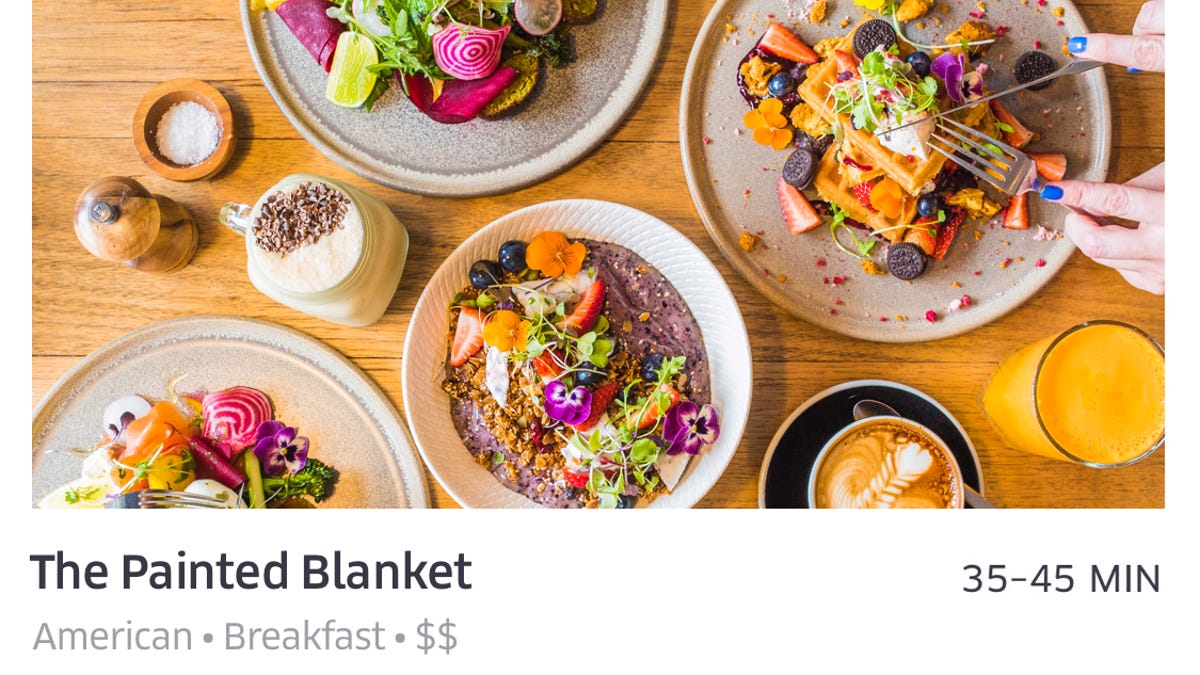UberEats knows what food you're craving before you do
The ride-hailing company's food-delivery service rolls out restaurant ratings, favorites and menu suggestions based on machine learning.

Now you'll see crowd sourced restaurant ratings in the UberEats app.
UberEats wants to get to know you.
The food-delivery service added three new features to its app on Thursday that aim to learn your tastes, preferences and likes. It'll now show "recommended for you" menu items, eater-generated restaurant ratings and also let you "favorite" certain dining spots. Essentially, UberEats is getting more personal.
"With such a large and growing selection of restaurants on the platform, we're thinking how can we show you what you want," said Ambika Krishnamachar, a product manager for UberEats.
UberEats is the food-delivery branch of the ride-hailing service Uber. Similar to how people can hail an Uber ride with the push of a button on their smartphone, they can also order food from dozens of local restaurants using the UberEats app.
UberEats suggests menu items based on what you've ordered in the past.
On-demand food is a competitive space. Besides UberEats, people have a multitude of apps to choose from. There's Caviar, Grubhub, Seamless, DoorDash and Postmates. There's also the old-fashioned choice of simply calling a restaurant and ordering food, although not all restaurants deliver. By making its service more personalized, UberEats aims to stand above the rest.
The food delivery service first launched in 2014 in Los Angeles under the moniker UberFresh. Then eventually it morphed into UberEats with an official launch in Toronto, Canada, in December 2015. By the end of 2016, UberEats was is 56 cities worldwide. Today it's in 130 cities and is slated to be in 200 by the end of the year. UberEats is even in some cities that don't have the ride-hailing service, such as Tokyo, Taipei and Seoul.
UberEats partners with restaurants, so restaurants can decide what they want to sell on the app. The company charges restaurants a service fee that's calculated as a percentage of its sales on the platform. Uber now has partnerships with 80,000 restaurants, which include everything from upscale eateries to McDonald's.
"With an increasing choice of selection it becomes a little bit more difficult to choose what you want to order," said Calvin Lee, UberEats product manager. Uber has created "technical solutions to solve some of the pain points for our customers."
UberEats' new "recommended for you" feature uses machine learning to personalize the app based on what each person is ordering and favoriting. It looks at past restaurant and menu item choices to make suggestions -- much like how Netflix makes movie recommendations. So, if you tend to order pasta, UberEats will likely show you a restaurant's spaghetti, lasagna or tortellini dishes.
"Every single consumer on the platform is super different," Krishnamachar said. "By learning your preferences we can more intelligently suggest food that you like."
UberEats' new restaurant ratings work a little differently. Krishnamachar said ratings aim to better guide eaters in picking restaurants and to help restaurants better learn what dishes are resonating with people. The feature will have a five-star rating system and show feedback over the last 90 days.
Sometimes negative ratings can hurt restaurants. Businesses have complained that they've lost customers after receiving bad ratings on sites like Yelp, OpenTable and MenuPages. Krishnamachar said negative ratings shouldn't harm UberEats' partner restaurants since they refresh on a rolling 90-day basis.
"It motivates a high-quality experience across the board," she said. "At the end of the day, we're reflecting what customers are saying."
'Alexa, be more human': Inside Amazon's effort to make its voice assistant smarter, chattier and more like you.
Rebooting the Reef: CNET dives deep into how tech can help save Australia's Great Barrier Reef.

